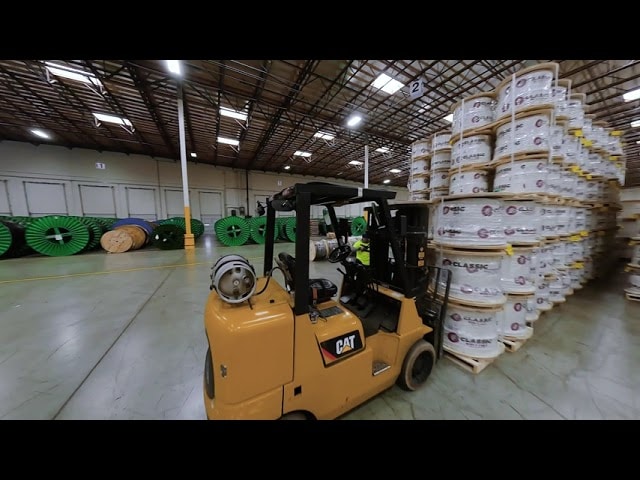The 2024 Manufacturing Marketing Guide: How to Win in the Digital Age
Author: Indoor Drone Tours
Posted 17 Oct 2023Today, manufacturing marketing has evolved into a sophisticated art form, and keeping up with the latest trends and strategies is essential for success. As manufacturing professionals, you understand the importance of innovation and adaptation in your industry.
In this guide, we will delve into the world of manufacturing marketing, exploring its significance, challenges, goals, strategies, and how to measure success. Plus, we’ll introduce a game-changing element that can elevate your marketing efforts to new heights: drone photography and videography production.
What Is Manufacturing Marketing?
Manufacturing marketing is the engine that powers your brand’s visibility and growth. It’s not merely about producing quality products; it’s also about effectively communicating your unique value proposition to your target audience. In today’s digital age, where consumers have endless choices at their fingertips, a robust marketing strategy is your ticket to standing out in a crowded marketplace.
As per recent studies, a whopping 90% of B2B buyers use online searches to research potential suppliers and vendors. This statistic underscores the critical role of digital marketing in the manufacturing industry. Prospective customers and partners are actively seeking information about your manufacturing company, and it’s your job to ensure that the information they find paints a compelling and authoritative picture of your brand.
What Are the Challenges of Manufacturing Marketing?
Manufacturing companies face their fair share of challenges in the marketing arena. From staying ahead of technological advancements to overcoming supply chain disruptions, the landscape is ever-changing. Additionally, understanding your customers’ evolving needs and preferences can be a moving target. To address these challenges, dynamic and flexible online marketing tactics are crucial.
1. Technological Advancements
In the digital era, staying up-to-date with the latest technologies is a must. Your manufacturing business must adopt new tools and platforms to remain competitive. This includes embracing emerging technologies like AI, IoT, and data analytics, which can streamline operations and enhance customer experiences.
2. Supply Chain Disruptions
From the pandemic to the war in Ukraine, recent global events have highlighted the vulnerability of supply chains. Effective marketing strategies must consider potential disruptions and build resilience through diversification and contingency planning.
3. Evolving Customer Expectations
The modern customer expects more than just quality products; they seek transparency, sustainability, and a personalized experience. Manufacturers must align their marketing efforts with these shifting expectations to remain relevant.
4. Competition
The manufacturing landscape is highly competitive. Effective marketing is crucial for differentiating your brand and capturing market share.
Manufacturing Marketing Goals
As a manufacturing professional, your goals for a successful marketing strategy are multi-faceted. Let’s explore some of these objectives:
Increase Brand Awareness
Elevating your brand’s visibility within your industry and beyond is paramount. Through strategic marketing efforts, you can ensure that your target audience recognizes your brand as a trusted leader in manufacturing.
According to the Content Marketing Institute, 84% of B2B marketers believe that increasing brand awareness is their top goal. A strong brand presence not only attracts customers but also fosters trust and credibility.
Generate Leads
Generating leads is the lifeblood of any successful marketing campaign. By offering valuable content and engaging with potential customers, you can build a robust pipeline of prospects interested in your products or services.
Content marketing generates 3 times more leads than traditional outbound marketing, according to HubSpot. This underscores the importance of producing high-quality content that educates, entertains, and informs your target audience.
Drive Sales
Ultimately, the goal of marketing is to boost sales. With effective strategies in place, you and your sales team can convert leads into loyal customers, driving revenue growth for your manufacturing business.
Improve Customer Retention
Retaining existing customers is often more cost-effective than acquiring new ones. By nurturing your customer relationships through marketing, you can increase customer loyalty and satisfaction.
A 5% increase in customer retention can lead to a 25% to 95% increase in profits, as reported by Bain & Company. This highlights the immense value of keeping your current customers engaged and satisfied.
Build Relationships With Partners
Partnerships and collaborations can open doors to new opportunities and markets. Marketing can help foster these relationships and create mutually beneficial partnerships.
Strategic partnerships can increase your reach and access to new markets, creating opportunities for growth and diversification.
Manufacturing Marketing Strategies
Now that we’ve covered the goals, let’s explore the strategies that can help you achieve them:
Content Marketing
Did you know that video is one of the most effective forms of content marketing? Studies show that video content not only grabs attention but also retains it. And when it comes to video, drone videos are the cream of the crop. Indoor Drone Tours can help you create high-quality drone videos that resonate with your target audience for your manufacturing business.
Video marketing is on the rise, with 86% of businesses using video as a marketing tool, according to Wyzowl. Furthermore, 93% of marketers believe that video is an essential part of their strategy. Investing in drone videos can set you apart from competitors and capture your audience’s imagination.
Tap Into The Power Of Drone Videos For Business Success
Search Engine Optimization (SEO)
Search Engine Optimization, commonly known as SEO, is a crucial aspect of modern manufacturing marketing that focuses on enhancing your online visibility and organic (non-paid) search engine rankings.
It’s essentially the process of optimizing your website and online content to make it more attractive to search engines like Google, Bing, and Yahoo. When done effectively, SEO can significantly boost your website’s search engine rankings, driving more organic website traffic and potential customers to your site.
Now, let’s delve into the key components and strategies involved in SEO:
- Keyword Research: SEO begins with thorough keyword research. This involves identifying the specific keywords and phrases that potential customers are likely to use when searching for manufacturing-related products or services. These keywords should align with your business offerings and target audience’s needs.
- On-Page Optimization: This aspect of SEO involves optimizing your website’s pages. This includes optimizing meta titles, meta descriptions, headers, and content to ensure they are keyword-rich and relevant. It also involves optimizing images, improving page load times, and ensuring mobile-friendliness, all of which contribute to a better user experience and improved search rankings.
- 3. High-Quality Content: Creating informative, engaging, and valuable content is a cornerstone of effective SEO. High-quality content not only attracts visitors but also encourages them to stay on your website longer, reducing bounce rates. Blog posts, articles, whitepapers, and product descriptions are all opportunities to showcase your expertise and build trust with your audience.
- 4. Link Building: Acquiring high-quality backlinks from reputable websites is a critical part of off-page SEO. These backlinks act as endorsements for your website’s authority and relevance. Building a diverse and natural backlink profile is essential for higher search engine rankings.
- 6. Local SEO: If your manufacturing business serves specific geographic areas, local SEO strategies can help you appear in local search results. This includes optimizing your Google My Business listing, acquiring local citations, and encouraging customer reviews.
Professional Drone Videos
Professional drone videos offer a captivating visual experience that surpasses traditional ground-based videography, providing stunning aerial perspectives of manufacturing facilities, products, and processes that instantly engage audiences. They enable immersive virtual tours, fostering transparency and impressing potential clients. These videos excel at portraying transformations in manufacturing, making them ideal for showcasing construction projects, production lines, or renovations.
Additionally, drone videos elevate brand storytelling with cinematic branding videos that convey a company’s ethos and values. For large-scale manufacturing, aerial drone videos offer sweeping panoramas that showcase the business’s scale, instilling confidence in potential clients and leaving a memorable impression.
Unlock the magic of drone technology to create virtual tours, before-and-after videos of your manufacturing plants, branding videos, aerial flythroughs, and more. Indoor Drone Tours specializes in crafting captivating drone content that can take your marketing efforts to new heights.
Tap Into The Power Of Drone Videos For Business Success
Social Media Marketing
Leverage the power of social media marketing to engage with your audience, showcase your products, and tell your brand’s story across different social media platforms.
Over 4.89 billion people use social media worldwide, according to Statista. This immense user base presents a vast opportunity to connect with your audience, share your content, and build a loyal following.
Email Marketing
Crafting personalized and informative email campaigns can nurture leads and keep your audience engaged. Email marketing delivers a $36 return on investment for every $1 spent, according to Litmus. This impressive ROI highlights the effectiveness of email campaigns in nurturing leads and retaining customers.
Trade Shows and Events
Capture the energy and excitement of trade shows and events with flythrough drone videos, showcasing your brand’s presence and offerings. 87% of marketers consider in-person events an essential part of their marketing strategy, as reported by Bizzabo. Incorporating drone videos into your event marketing can create a buzz and generate interest both before and after the event.
Public Relations
Extend your reach by syndicating your content on other websites and industry platforms. Syndicating your content on reputable industry websites can increase your brand’s exposure and position you as an industry leader. Backlinks from authoritative sites can also boost your SEO efforts.
Webinars and Workshops
Educate your target audience through webinars and workshops, positioning your brand as an industry thought leader. Webinars are a powerful tool for educating your audience and establishing your authority. 73% of B2B marketers believe that webinars are one of the most effective methods for generating high-quality leads, according to Demand Gen Report.
Word-of-Mouth Marketing
Harness the power of satisfied customers by encouraging referrals and reviews. 83% of consumers trust recommendations from friends and family, as stated by Nielsen. Encouraging word-of-mouth marketing can tap into this trust factor and drive new business.
Measuring the Success of Your Manufacturing Marketing
Achieving your marketing goals is only possible if you can measure your progress. Here’s how:
Set Clear Goals and Track Your Progress
Establish specific, measurable, and time-bound goals to track your marketing efforts’ effectiveness.
SMART goals (Specific, Measurable, Achievable, Relevant, Time-Bound) provide a clear roadmap for your marketing strategy. These goals enable you to measure progress accurately and make data-driven decisions.
Use Analytics to Measure the Results of Your Marketing Campaigns
Leverage analytics tools to gain insights into what’s working and what needs improvement. Metrics like website traffic, conversion rates, and ROI can provide valuable data across all marketing channels.
Google Analytics is a powerful tool for tracking website performance, while email marketing platforms provide detailed insights into email campaign engagement.
Make Adjustments to Your Strategies As Needed
Stay flexible and adapt your strategies based on the data and insights you gather. Continuous improvement is the key to long-term marketing success.
Regularly review your marketing campaigns and performance metrics to identify areas for improvement. A/B testing, audience segmentation, and feedback analysis can help you refine your strategies for maximum impact.
Conclusion
Manufacturing marketing is a dynamic and multifaceted endeavor that requires creativity, adaptability, and a willingness to embrace innovation. By following the strategies and tactics outlined in this article, you can not only reach your target audience but also achieve your marketing goals.
And remember, for breathtaking drone videos that can take your manufacturing marketing to the next level, Indoor Drone Tours is here to elevate your brand’s storytelling and captivate your audience like never before.
Embrace the digital age, and let your manufacturing marketing soar to new heights!


